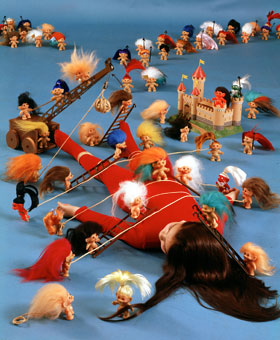Fear and being a business owner go hand in hand. We worry about whether we are doing the right things to get notice… then we worry about being noticed because of what will they think. We can’t help but think it. Even the most secure of us still wonders what they could be doing differently, better, faster. The whole problem with this mindset is that we are placing the stress on ourselves by comparing our lives with others and using them as a measuring stick. It’s enough to drive you mad.
That’s really unfair to both you and the measuring stick.
First off, what works for one person may not work for another. If all things worked the same, there would be no need for a bajillion consultants, and twice as many marketing assistance. So, following someone’s script to the letter and buying every programme you can to just get a little more insight is wasteful and exhausting. It’s far better to scan through the many options for ideas, then pair yourself up with only one or two that really resonate with you to work with.
Secondly, if you have a business or life crush, you need to realise that you are not the same person, and by putting them on high, you are doing them a disservice. How? You’re dismissing their full story that brought meaning to their life and made them great in the first place. You do this by placing them on the pedestal and forgetting the little nuances that drew you to them in the first place.
For example, I look up to James Dyson greatly after reading Against All Odds. It was an amazing book that shows the world how the famous vacuum was made starting with frustration that his old Hoover didn’t suck the dust up. He talked about the trials of design, the failures he encountered. He also talked about legal troubles and trolls that tried to steal his invention. If I were to use Dyson and his story as my measuring stick, I fall miserably short. If I put him on a pedestal to measure against, I dismiss the full truth of his story and him as a person.
Clearly, using the heroes of our field as a measuring stick is going to fail. However, using them as a model when we are thinking about what we should do for our own company is inspiring. If I had the chance to meet Dyson (besides thinking that I won the jackpot), I would ask him what he thinks Insanitek’s strengths and weaknesses are. I would ask him for advice and really listen to what he said. Then, I would measure that against what my heart says. After all, innovation comes from trying new things at new times.
We are not our idols, nor anyone else on the internet. Reading through for ideas and getting ideas for what you can do is far different from following their status quo instead of your heart. So forget about doing “all the right things” to make your business into what you want it to be. Those programmes are designed by their measuring stick, not your own. Look for ideas, try things, and discard the ones that don’t work. Push boundaries constantly and grow your business and life your way.
And those haters?
Trolls exist everywhere. You’ll run into them on social media, your blog comments, your community that you thought was safe. Someone is always going to have an opinion of what you are doing, and they will give you their opinion whether or not you asked.You can go two ways with this: You can ignore them because you’re following your dreams and developing your community of ideal clients (not just everyone, including the hateful trolls) or you can listen to what they have to say with a critical ear. You never know, you might find something of value in their anger.

Don’t let the trolls tie you down. Image from LifeSpiral.
Sarah, a friend of mine who is no longer in business (she decided to move to the middle of no and where to be with her husband on safari and raise 3 kids instead of running a lab full-time) once had a troll ranting and raving in the comments on her blog about feminism. The rant went on for some time covering the basis of feeding the problem by not hiring more women in her lab, not allowing the kids to be nearby (in a highly toxic environment), and finally ended with telling her how to run her own consulting company.
Besides laughing for about 20 minutes at the wall of text, Sarah managed to gasp for enough oxygen to read that this particular person was decrying the injustices that she herself faced. Sarah responded in a compassionate way and directed her to a place where this individual could develop some of their lab skills and interpersonal skills in a woman-only environment. Later, Sarah called me to tell me that a troll might be joining our women’s only club. Sure enough, I greeted this young lady to find out that she had a really rough time of it because of self-esteem issues. Her skills weren’t the problem, but she felt inadequate around males, which in turn contributed to her making really lame mistakes that could cost her dearly. I’m glad Sarah spoke up to help the young lady, as she’s now an unstoppable scientist in her own right.
Sometimes, just sometimes, trolls can show you things about your company or life that you didn’t expect. Read carefully, react appropriately either by laughing and hitting trash button on the comment or respond kindly, thanking them for the clarity they have added to your vision. Just don’t expect to solve their problems and please them.
Is it the fear of failure in meeting these expectations? Or is it the fear of the internet trolls that speak loudly about their thoughts and feelings as often and where ever they can sling their hate? Is it both? What do you do about it? I’d love to hear your take in the comments!








